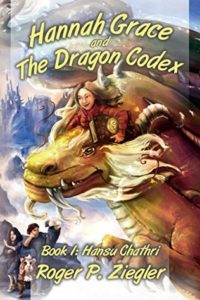“How Kids Can Stop Thinking and Make Better Life Choices”
Dreaming and imagination are fundamental to solving practical problems, in school, at home or in the office. Both big problems and everyday ones.
One of the challenges the lead character in my book Hannah Grace and The Dragon Codex faces, is how does she know she’s making the right decision?
She wants to do good, be good, but how do you know? For Hannah it comes down to trusting her imagination and heart. When she does this, things usually go well, when she doesn’t, they go kerflewy.
So what is Hannah learning? In everyday life when we don’t know the answer we usually say, “let me think about it,” or we encourage kids to “think hard” to find a solution. But this kind of problem solving is like using a hamster on a running wheel to power a jet plane.
As the great scientist and mystic Albert Einstein said, “we cannot solve our problems with the same thinking we used to create them.”
We need more fire power to make better decisions and life choices. Where do we get it? From our heart and our gut. Our feeling and sensing centers.
One of the greatest pleasures of my life as a child, and now, is playing with my imagination, feeling out a situation. When I do, it makes my writing much better and my daily life easier.
When we connect the triangle of heart, gut and mind to make decisions, we engage our “Power Trio” and make better life choices.
These skills are not only for adults; they are essential for children. And great news, kids are usually naturals at this. We only need to encourage them to go in the direction they’re already heading.
Getting kids out of our adult habit just “thinking about it,” is one of the best things we can teach them.
Encouraging children to make decisions using their heart, mind and gut “Power Trio,” may help when they’re 20 or 30 or 40 years old and in a crisis. They’ll have developed skills and won’t need to reach for a self-help book that tells them to engage their heart and gut more.
Stop thinking. You’ll be better off. As the great sage Yoda said, “Do or do not. There is no ‘try’.”
So then, what do you do instead?
How To Make Better Decisions By Not Thinking About It
ASK, “HOW DOES IT FEEL?” INSTEAD OF “WHAT DO YOU THINK?”
Kids are experts in expressing their feelings and playing with their imaginations. Imagination, in my experience, comes mostly from a feeling, not from our heads.
Instead of only “thinking hard” about a solution to a math or science or English problem, make it a game. Ask the child to look at the big picture. Have them compare the problem or the situation to something in their own life. An event, their family, things they have or want. Let them use their big picture skills to solve the problem.
BE HERE NOW
It’s a cliché, but it’s a cliché for a reason. Become aware of what is actually happening right now. Not what you think is happening, or what you wish was happening, but what is actually taking place.
Take a moment to stop your thoughts and notice, just notice, what you see and hear and experience that. This alone can bring about an awareness of options that weren’t there before.
Kids are generally much better at this than adults. Usually, all you need to say to a child is, “stop thinking for a moment,” and they usually get it.
Older kids already conditioned to “think about it,” make take more training.
TAKE A DEEP BREATH
Another cliché and yet, still one of the best ways to stop yourself and kids from over-thinking and making bad choices.
A simple deep breath in and longer breath out, can do wonders to stop the chattering mind and cool the situation. Give peace a chance, bro!
VISUALIZE
Cliché number 3? See and imagine your success as having already taken place before you begin. See yourself making the basket before you take the shot. What does it look like and feel like?
Imagine organizing the numbers correctly before you solve the math problem. And then practice this. These things, like anything worth having, take time.
Just because you imagine yourself sinking the basket doesn’t mean it will happen the first time or every time. But I’m betting it will happen much more often than if you don’t imagine that it already happened.
Which leads us to the next better decision skill for children.
DON’T QUIT
We all face obstacles when doing something new or even when we’ve done it 10,000 times. Allow yourself to make mistakes and keep going.
Discouraging children when they are beginning something new, is the biggest killer of success and imagination in my opinion.
KEEP IT A GAME
This is fun. If we turn the above steps into dry, boring, abstract lessons, we’ve missed the point. The goal here is to let our heart feelings and gut senses play free. Your true feelings will always result in more fun and enjoyment, and better results for you and the people around you.
In my book Hannah learns this, after many, many struggles to fight it.
I’ll end with our friend Einstein; “When I examine myself and my methods of thought I come to the conclusion that the gift of fantasy has meant more to me than my talent for absorbing positive knowledge.”
Just something to think about.
Hannah Grace and the Dragon Codex
Author: Roger P. Ziegler
Illustrator: Nicole Ales
Published May 12th, 2016
About the Book: When an ancient book of wisdom is stolen, 11-year-old Hannah Grace and her karate besties must discover their true powers and rescue the book before Big Evil takes over the Universe.
Magic, positivity, adventure (and a sumo wrestling guinea pig), await readers in the first book of this coming of age fantasy series. It’s perfect for all kids who love to get lost in worlds of wonder and imagination.
Every day after school, Hannah Grace does her homework and practices karate with her father John. But one morning when Hannah wakes from a strange dream where she sees an ancient and mysterious book, she’s more than a little shocked when her dad reveals an amazing secret; it’s The Dragon Codex, the most powerful book ever created and he needs Hannah to find it before Big Evil gets it and takes over the Universe!
Suddenly, Hannah, who can barely remember her homework, is thrown into a much larger world of magic and danger–and a whole lot of people are counting on her.
Hannah’s got it covered though. Actually, she has no idea what to do, but she’s not giving up just yet.
Filled with mysteries, demons and a sumo wrestling guinea pig, Hannah Grace and The Dragon Codex is a fun, thrill-ride adventure about discovering the power inside you.
About the Author: Roger long ago rejected the sensible (and sane), advice of his parents to be a lawyer or doctor and became a writer instead. He’s been a journalist, taxi driver, actor, theater producer, collection agent and so much more!
He’s received writing awards from the New York State Press Association and the Physicians for Social Responsibility. Roger coauthored the Amazon “beast” selling humorous self-help book Pee On It and Walk Away: How to Deal with Difficult People. Life Lessons from Superdog Abby, www.peeandwalk.com.
Roger is a third-degree black belt in Seido karate and has a wonderful, magical nine-year-old daughter. Roger likes fudge.
This is his debut novel.
Thank you to Roger for this post we can use to remind our students to think, breathe, and assess.



